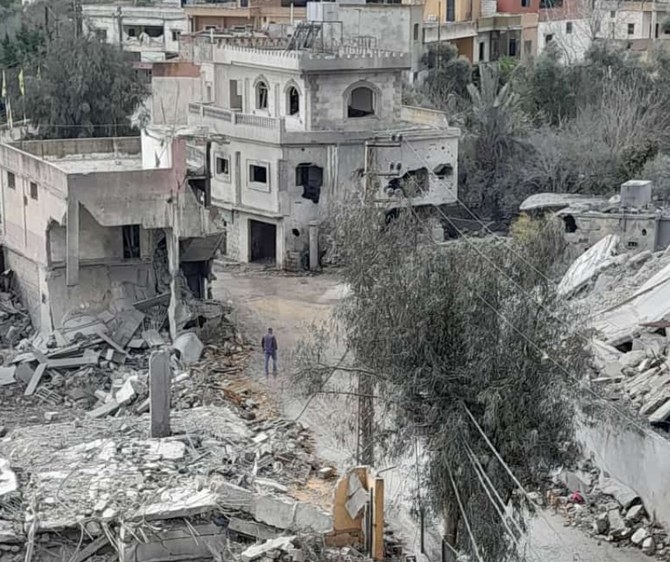
- ARAB NEWS
- 29 Apr 2024

BEIRUT: Residents and traders in southern Lebanon have accused Israel of adopting a “scorched earth policy” amid continuing hostilities in the region.
A security source said on Saturday that Israel was setting out to destroy residential houses and neighborhoods, as well as industrial and commercial facilities, while public and secondary roads were also being blocked to hinder the arrival of supplies.
Mohammed Saleh, president of the Chamber of Commerce, Industry, and Agriculture in southern Lebanon, said that Israeli forces “no longer spare industrial and commercial institutions,” adding: “This is certain, and we are confident of it.”
Saleh told Arab News that the army was resorting to burning trees and crops with phosphorous shells, a policy that was avoided in previous wars.
Almost 100,000 people displaced from the border area did not know the fate of their properties and homes, he said.
“They rely on what is reported by some people who dare to reach their isolated villages, or those who insist on participating in the funeral processions of the dead in the towns for a few hours before returning to their displacement areas.”
Saleh said: “It is difficult to determine the full extent of the losses in the southern region, as the repercussions have extended beyond the border area, including areas north of the Litani River, when the Israeli enemy bombed the industrial zone in the coastal town of Ghaziyeh weeks ago.”
Israeli fighter jets flying at low altitudes also spread fear among people and affected productivity, he added.
“The percentage of losses exceeds 45 percent. The south’s agriculture, industry, and commerce have declined by more than 50 percent. The decline in exports ranges from agricultural products to the food industry and other goods.
“Factories in the border region are entirely shut down. Machines have stopped working, and so have power generators.”
He said that in areas close to the border, work has decreased by 60 percent due to the security situation.
Saleh’s remarks came as an Israeli missile landed near a Lebanese army site south of the border town of Rmaych. No casualties were reported.
Israeli artillery also targeted the Marjayoun-Khiam Valley.
Israeli raids and shelling resumed in the villages of Markaba, Al-Wazzani, Marwahin, Tayr Harfa and Dhahira, reaching Naqoura, Alma Al-Shaab, Aita Al-Shaab, Mays Al-Jabal, the entrance of Odaisseh, Houla and Kfarkila.
A Merkava tank in the Metula settlement launched missiles at an area between Deir Mimas and Kfarkila on Saturday afternoon.
A resident in one of the villages said that Israeli shelling had become sporadic, targeting civilians working on their land.
Israeli “aggression is no longer limited to Hezbollah members as it has been the past five months,” he said.
Hezbollah said that it had struck the Israeli military outpost of Al-Baghdadi with missiles, and also hit the Ramim outpost with two Burkan missiles.